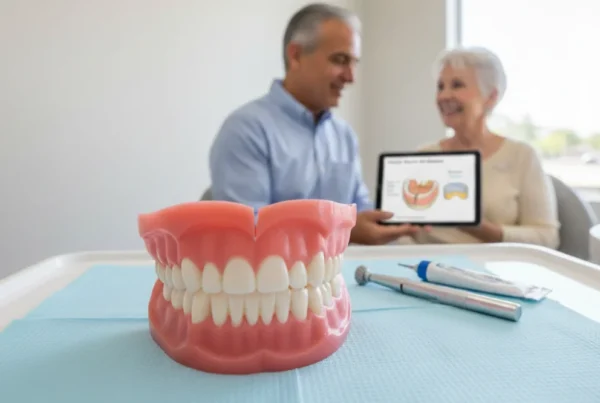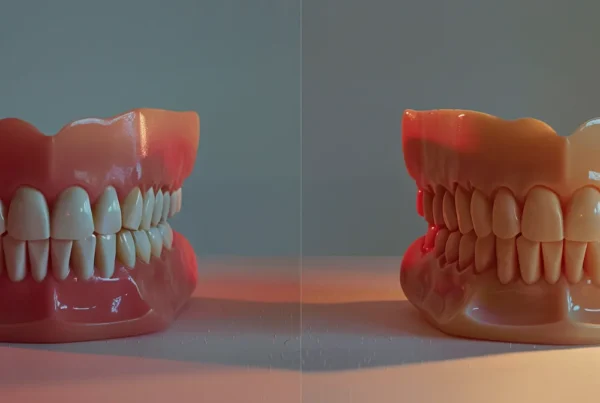Are you looking for dentures near me in Grand Prairie TX?
Losing your teeth can feel like the end of your smile. But it doesn’t have to be.
With today’s modern dentures, you can restore your smile and enjoy life with a full set of teeth again. Keep reading to learn everything you need to know about getting dentures in Grand Prairie, TX.
What Are Dentures?
Dentures, unlike dental implants, are custom-fitted removable appliances that replace missing teeth and surrounding tissues. They consist of a gum-colored base that supports artificial teeth. Dentures are held in place by suction, denture adhesive, or implants.
There are two main types of dentures:
- Full dentures replace all teeth in an arch. They may be worn on just the upper or lower arch, or on both.
- Partial dentures fill in gaps where only a few natural teeth are missing. They attach to nearby teeth with metal clasps or devices called precision attachments.
Dentures can be made from acrylic, nylon, or metal alloys. Acrylic is the most common. It has a gum-like color and is lightweight. High-end dentures may use porcelain or composite resin teeth for a more natural, aesthetic look.
Who Might Need Dentures near Grand Prairie TX?
Dentures are an option for anyone missing multiple permanent teeth. Common reasons for tooth loss include:
- Gum disease
- Tooth decay
- Injury/trauma
- Congenital defects
Dentures may be indicated after:
- Full mouth extractions
- Partial extractions if gaps can’t be fixed with bridges or implants
- Loss of teeth later in life after periodontal disease
Candidates for full dentures include:
- Senior citizens who’ve experienced long-term oral health decline
- Younger people with congenitally missing teeth or trauma-related tooth loss
- Patients undergoing major maxillofacial surgery or head and neck cancers
- Individuals with painful teeth requiring multiple extractions
Partial dentures can be ideal for:
- Replacing a few lost teeth while retaining some natural teeth
- Transitioning to full dentures by extracting failing teeth over time
- Restoring aesthetic appearance around a highly visible tooth gap
Talk to your Grand Prairie dentist to determine if and what type of dentures are right for you.
5 Signs You Might Need Dentures near Me
How can you tell if you’re ready for dentures? Here are 5 signs it may be time to consider them:
- Missing multiple permanent teeth – If you’re missing several adjacent teeth, you’ll likely need a partial or full denture to restore chewing and speaking ability.
- Visible gaps or loose teeth – Gaps from missing teeth or loose natural teeth that may need extracting indicate dentures could help.
- Difficulty eating and speaking properly – Trouble biting, chewing or enunciating words can signal your remaining teeth aren’t supporting necessary oral functions.
- Changes in facial appearance – Missing teeth often lead to sunken cheeks, sagging lips and wrinkles around the mouth that dentures can help fill out.
- Tooth or jaw pain – Ongoing dental pain from damaged teeth, gaps or misalignment may be resolved by extracting unsalvageable teeth and getting dentures.
Don’t suffer with missing, damaged or ill-fitting teeth. If you notice any of these issues, dentures could be your solution for revitalizing your smile.
What to Expect After Visiting Dentures Near Me Grand Prairie
Dentures require an adjustment period as you get used to speaking, chewing and smiling with your new teeth. Here’s what to expect:
Initial recovery: After getting immediate dentures placed on the same day as extractions, expect denture-related soreness for several days. Take prescribed pain medication as directed. Adjustments to your immediate dentures may be needed within the first couple weeks.
Healing period: Healing after extractions takes 4-12 weeks. During this time, your gums will change shape as they heal, so your immediate dentures will become loose. Use denture adhesive to help them stay put until you receive relined or permanent dentures.
Adjusting to permanent dentures: You’ll need time to adapt to eating and talking with permanent dentures during the first few months. Practice reading out loud and try soft foods to adjust. Sore spots can be relieved with more adjustments from your denturist.
Ongoing denture care: Maintain your dentures daily by brushing to remove plaque and soaking them at night. See your denturist at least yearly to inspect for needed repairs or relining to improve the fit as your gums change. With proper care, dentures can last 5-7 years or longer.
Patience, practice and follow-up adjustments are key to getting comfortable with your new smile. The initial period may be bumpy but the long-term benefits of restored confidence and dental function make dentures well worth it for most.

The Risks of Untreated Tooth Loss
Missing teeth that aren’t replaced with dental prosthetics like dentures, bridges or implants can negatively impact your oral and overall health. Leaving tooth gaps unattended also affects your appearance and quality of life. Potential risks include:
- Progressive tooth loss – When teeth go missing, the remaining teeth can shift and overerupt. This disrupts your bite and leads to additional tooth damage and loss.
- Bone loss – Missing teeth don’t stimulate the jawbone like natural tooth roots do. This can cause bone loss and changes in facial structure over time.
- Digestion problems – Your ability to properly chew and break down food for digestion depends on having teeth. Tooth loss can also limit your diet.
- Speech changes – Gaps from missing teeth affect your pronunciation of certain words. This can reduce speech clarity.
- Low self-esteem – Missing front teeth especially can make people reluctant to smile or talk. This damages self-confidence.
Getting dentures or other tooth replacements prevents these issues. Protect your health, appearance and quality of life by consulting your dentist about options to replace lost teeth.
Dentures Statistics
- 17% of adults aged 65 and over who have lost all of their teeth
- Adult aged 20-65 only have 25 remaining teeth
- 1.2 billion size of global denture adhesive market in 2027
Final Thoughts
Getting dentures in Grand Prairie, TX through an experienced local dentist like Dr. Behrooz Khademazad at Grand Prairie Family Dentistry can help you regain not just your beautiful smile but also your essential oral functions.
Using the personalized care and today’s modern dentures, you can say farewell to tooth loss and hello again to clear speech, confident smiles, and healthy chewing that dentures make possible.
Schedule your FREE consultation today!
Dentures Q&A’s
How much does a set of dentures cost in Texas?
The cost varies, but complete dentures can range from $600 to $2,500 for a set, while partials may cost between $300 to $1,500, depending on materials and complexity. Some dental insurances cover a portion of the cost.
How much do dentures cost in Texas without insurance?
Uninsured patients pay $1,200-$4,500 out of pocket for a set of basic full or partial dentures in Texas. Getting dentures with dental insurance reduces your costs, with many plans covering 50% of standard denture fees.
How long do dentures last?
With proper care, dentures can last between 5 to 7 years before they may need to be replaced due to wear or fit changes.
Is it difficult to eat with dentures?
There’s an adjustment period, but most people adapt quickly and can eat normally. Starting with soft foods and practicing can help.
How do I care for my dentures?
Clean them daily with a soft brush and denture cleaner, soak them overnight in a denture solution, and handle them carefully to avoid damage.
What are the newest types of dentures?
Some newer denture options include:
- 3D printed nylon polymer dentures customized from your digital scan
- Mini dental implants secured dentures for a non-removable feel
- Snap-on dentures with strong integrated plastic snaps
How What are implant dentures?
Affordable dental Implant dentures, constructed using materials like acrylic or porcelain, provide a dependable solution for restoring missing teeth. They offer the stability of dental implants, replicating natural tooth roots, and boast impressive durability compared to traditional dentures.
Do snap-on dentures really work?
Snap-on dentures feature integrated snaps that attach to dental implants or anchor teeth. They can provide a secure fit, but still require implants or extracting certain teeth determined by a dentist. Overall effectiveness depends on proper clinical procedures.
What type of dentures are most natural looking?
The most natural-looking dentures use porcelain teeth and gum-colored acrylic bases precisely fitted to your mouth. Cosmetic enhancements like staining and veining can further create realistic, aesthetic results. Highly skilled denturists can craft remarkably lifelike dentures.

Grand Prairie Family Dentistry
Contact Us
Phone:
972-988-0900 (office)
Address:
2475 W Pioneer Pkwy
Grand Prairie, Texas, 75051








